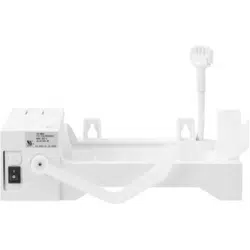Loading ...
Loading ...
Loading ...

12
www.insigniaproducts.com
Connecting the ice maker to the water supply
Before you begin, please note:
• This water line installation is not warranted by the refrigerator or ice maker
manufacturer.
• Follow these instructions carefully to minimize the risk of water damage.
• Water hammer (water banging in the pipe) in house plumbing can cause
damage to refrigerator parts and lead to water leakage or flooding. Call a
qualified plumber to correct water hammer before installing the water
supply line to the refrigerator.
• To prevent burns and product damage, do not hook up the water line to the
hot water line.
• If you use your refrigerator before connecting the water line, make sure that
the ice maker wire signal arm is in the OFF position.
• Do not install the ice maker tubing in areas where temperature falls below
freezing.
• When using any electrical devices (such as a power drill) during installation,
make sure that the device is double insulated or grounded in a manner to
prevent the hazard of electric shock, or that the device is battery powered.
• All installations must be in accordance with local plumbing code
requirements.
1 Disconnect the refrigerator from the electric wall outlet.
2 Remove the parts in the water line kit that you purchased for this purpose.
3 Connect the end of the water supply line to the household cold water line
behind the refrigerator. Choose a location for the valve that is easy to access.
We recommend that you connect it to the side of a vertical water pipe. If it is
necessary to connect it to a horizontal water pipe, make the connection to the
top or side, rather than at the bottom, to avoiding drawing off any sediment
from the water pipe.
4 Make sure that the household water supply is turned off, then drill a ¼” hole in
the water pipe (even if using a self-piercing valve), using a sharp bit. Remove
any burrs resulting from drilling the hole. Take care not to allow water to drain
into the drill. Failure to drill a ¼” hole may result in reduced ice production or
smaller cubes.
5 Fasten the shutoff valve to the cold water pipe with the pipe clamp, then
tighten the pipe clamp screws until the sealing washer begins to swell. Do not
over-tighten or you may crush the tubing.
6 Route the tubing through a hole drilled in the wall or floor (behind the
refrigerator or adjacent base cabinet) as close to the wall as possible.
7 Connect the tubing to the valve by placing the compression nut and ferrules
(sleeves) for copper tubing onto to the end of the tubing and connect it to the
shutoff valve. Make sure that the tubing is fully inserted into the valve.
WARNINGS:
• The ice maker should be installed by an authorized service technician.
• Make sure that the refrigerator is unplugged to eliminate the danger of
electric shock during installation.
Note: Make sure that there is sufficient extra tubing to allow the refrigerator to
move out from the wall after installation.
Loading ...
Loading ...
Loading ...
